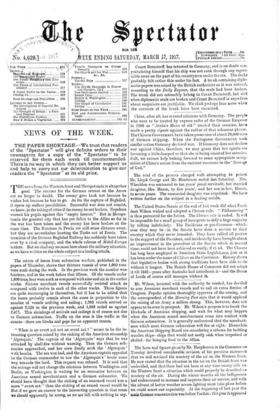" When is an overt act not an overt act
? " seems to be the in- teresting question raised by the sinking of the American steamship Algonquin.' The captain of the Algonquin' says that he was attacked by shell-fire without warning. Then the German sub- marine approached, and her crew finally sank the Algonquin' with bombs. The sea was bad, and the American captain appealed to the German commander to tow tho ' Algonquin's ' boats some way towards the land. This request was refused. It is said that the outrage will not change the relations between Washington and Berlin, as Washington is waiting for an encounter between an American armed merchantman and a German submarine. We should have thought that the sinking of an unarmed vessel was a more " overt act " than the sinking of an armed vessel would be But if we gave an answer to the interesting question in that sense we should apparently be wrong, so we are left with nothing to say.
Count Bernstorff has returned to Germany, and is no doubt con. gratulating himself that his ship was not sunk through any regret- table error on the part of his countrymen miler tLe sea. The decks probably felt rather thin under his feet. A trunk containing diplo- matic papers was seized by the British authorities as it was noticed, according to the Daily Express, that the seals had been broken. The trunk did not ostensibly belong to Count Pei nateaff, but still when diplomatic seals are broken and Count Beenstoiff is anywhere about suspicions are justifiable. We shall pelhaps hear more when the contents of the tiunk have been examined.


































